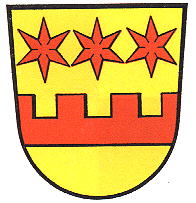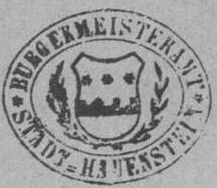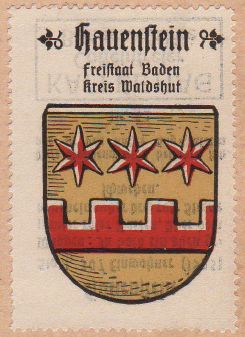Hauenstein (Laufenburg): Difference between revisions
Jump to navigation
Jump to search
Knorrepoes (talk | contribs) m (Text replacement - "50 pxCategory:Baden-Württemberg" to "Category:Baden-Württemberg") |
Knorrepoes (talk | contribs) m (Text replacement - " :" to ":") Tags: Mobile edit Mobile web edit |
||
| (19 intermediate revisions by the same user not shown) | |||
| Line 1: | Line 1: | ||
'''HAUENSTEIN''' | '''HAUENSTEIN''' | ||
State : [[Baden-Württemberg]]<br/> | State: [[Baden-Württemberg]]<br/> | ||
District (Kreis) : [[Waldshut (kreis)|Waldshut]] (until 1973 [[Säckingen (kreis)|Säckingen]])<br/> | District (Kreis): [[Waldshut (kreis)|Waldshut]] (until 1973 [[Säckingen (kreis)|Säckingen]])<br/> | ||
Incorporated into : 1972 [[Laufenburg (Baden)]] | Incorporated into: 1972 [[Laufenburg (Baden)]] | ||
[[File:hauenst1.jpg|center|Wappen von {{PAGENAME}}]] | [[File:hauenst1.jpg|center|alt=Wappen von {{PAGENAME}}/Arms (crest) of {{PAGENAME}}]] | ||
= | {| class="wikitable" | ||
In Gold ein erniedrigter, oben gezinnter roter Balken, darüber drei sechsstrahlige rote Sterne nebeneinander. | |+Official blazon | ||
|- | |||
|'''German''' | |||
| In Gold ein erniedrigter, oben gezinnter roter Balken, darüber drei sechsstrahlige rote Sterne nebeneinander. | |||
|- | |||
|'''English''' | |||
| blazon wanted | |||
|} | |||
===Origin/meaning=== | ===Origin/meaning=== | ||
Hauenstein received city rights in 1317 and was until 1805 a possession of the Dukes (later Emperors) of Austria.<br/> | Hauenstein received city rights in 1317 and was until 1805 a possession of the Dukes (later Emperors) of Austria.<br/> | ||
The arms are derived from the arms of the Lords of Hauenstein from the early 14<sup>th</sup> century. The arms were devised in the beginning of the 20<sup>th</sup> century, as the city never used its own seals. | The arms are derived from the arms of the Lords of Hauenstein from the early 14<sup>th</sup> century. The arms were devised in the beginning of the 20<sup>th</sup> century, as the city never used its own seals. | ||
{|align="center" | {|align="center" | ||
|align="center"|[[File:hauenstein.hagd.jpg|center|Wappen von {{PAGENAME}}]] <br/>The arms by [[Otto Hupp|Hupp]] in the [[Kaffee Hag albums]] +/- 1925 | |align="center"|[[File:{{PAGENAME}}1892.jpg|center|Siegel von {{PAGENAME}}]] <br/>The municipal stamp shown in 1892 | ||
|align="center"|[[File:hauenstein.hagd.jpg|center|Wappen von {{PAGENAME}}/Coat of arms (crest) of {{PAGENAME}}]] <br/>The arms by [[Otto Hupp|Hupp]] in the [[Kaffee Hag albums]] +/- 1925 | |||
|} | |} | ||
{{de}} | |||
{{media}} | {{media}} | ||
[[Civic Heraldry Literature - Germany|Literature]] : Stadler, 1964-1971, 8 volumes; Huber, 1982 | [[Civic Heraldry Literature - Germany|'''Literature''']]: Stadler, 1964-1971, 8 volumes; Huber, 1982 | ||
[[Category:German Municipalities H]] | |||
[[Category:Baden-Württemberg]] | [[Category:Baden-Württemberg]] | ||
[[Category:Waldshut]] | [[Category:Waldshut]] | ||
Latest revision as of 11:07, 11 August 2024
HAUENSTEIN
State: Baden-Württemberg
District (Kreis): Waldshut (until 1973 Säckingen)
Incorporated into: 1972 Laufenburg (Baden)
| German | In Gold ein erniedrigter, oben gezinnter roter Balken, darüber drei sechsstrahlige rote Sterne nebeneinander. |
| English | blazon wanted |
Origin/meaning
Hauenstein received city rights in 1317 and was until 1805 a possession of the Dukes (later Emperors) of Austria.
The arms are derived from the arms of the Lords of Hauenstein from the early 14th century. The arms were devised in the beginning of the 20th century, as the city never used its own seals.
| The municipal stamp shown in 1892 |
The arms by Hupp in the Kaffee Hag albums +/- 1925 |
This page is part of the German heraldry portal Deutsche Wappensammlung |
Heraldry of the World |
|
German heraldry:
|
Selected collector's items from Germany:
|
Contact and Support
Partners:
Your logo here ?
Contact us
© since 1995, Heraldry of the World, Ralf Hartemink 
Index of the site
Literature: Stadler, 1964-1971, 8 volumes; Huber, 1982














